Struggling with Obesity in Midlife? VitalTrak Can Help

Understanding the Challenge of Midlife Obesity and Effective Solutions
Obesity in midlife is a pressing health concern that significantly impacts quality of life and longevity. As physiological changes such as hormone fluctuations, muscle loss, and fat redistribution occur during this stage, the risk for chronic diseases like cardiovascular disease, diabetes, and certain cancers rises sharply. Addressing this complex issue requires a comprehensive, multi-dimensional approach that combines lifestyle modifications, medical treatments, and behavioral health strategies. This article explores scientific insights and clinical guidelines to support midlife individuals in managing obesity effectively, emphasizing how VitalTrak’s integrative programs are tailored to meet these needs.
The Impact of BMI and Weight on Overall Health
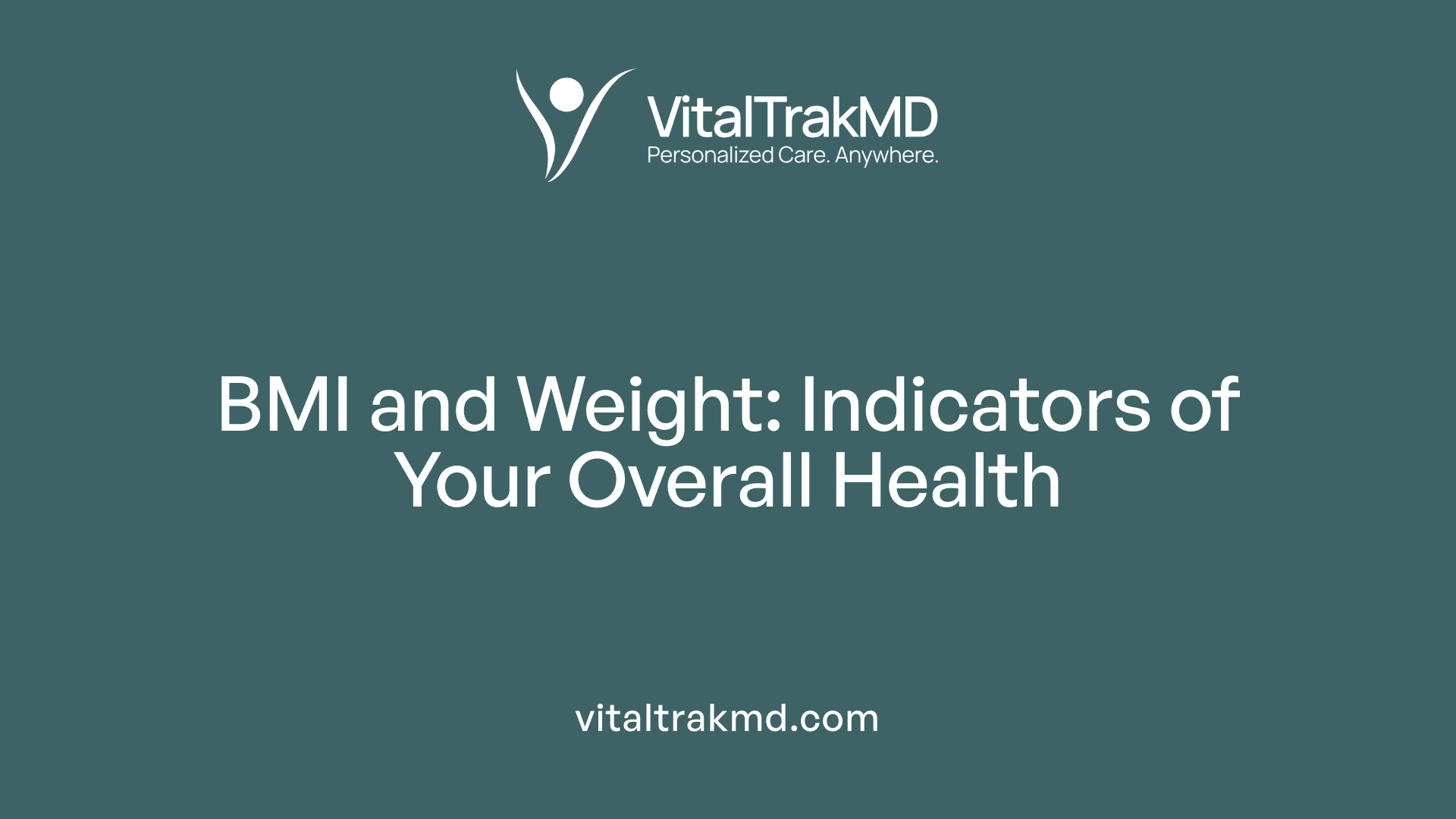
How does BMI and weight impact overall health, and what are effective ways to improve health outcomes through weight control?
Body Mass Index (BMI) is a common measurement used to assess whether an individual has a healthy weight relative to their height. A BMI between 18.5 and 24.9 is considered normal, while values over 25 indicate overweight, and over 30 classify as obese. Research consistently demonstrates that a higher BMI correlates with increased risks of several chronic diseases, including type 2 diabetes, heart disease, stroke, certain types of cancer, sleep apnea, and joint problems. Elevated visceral fat, especially around the abdomen, is particularly harmful because it promotes inflammation and hormonal imbalances that exacerbate health risks.
While BMI is a useful screening tool, it doesn't fully reflect fat distribution or muscle mass. Therefore, measuring waist circumference—less than 40 inches for men and less than 35 inches for women—is also important for a comprehensive health assessment.
Improving health outcomes involves multiple strategies. Adopting a balanced diet rich in vegetables, fruits, whole grains, nuts, and lean proteins can help reduce fat accumulation. Diets such as the Mediterranean, DASH, and plant-based options are particularly effective.
Complementing dietary changes with regular physical activity, including aerobic and resistance exercises, can help lower BMI and visceral fat. Even modest weight loss of 5-10% can significantly improve insulin sensitivity, lower blood pressure, and reduce blood cholesterol levels.
Behavioral modifications—like mindful eating, portion control, stress management, and improving sleep quality—are integral to sustaining weight loss. Innovative medical options, including GLP-1 receptor agonists such as semaglutide, show promising results in reducing BMI and associated health risks.
Overall, combining energy balance through diet and exercise with behavioral health interventions provides the most effective approach. These lifestyle changes not only help achieve lower BMI but also improve fat distribution, thereby significantly enhancing overall health and reducing the risk of chronic diseases.
Health Risks of Obesity in Midlife
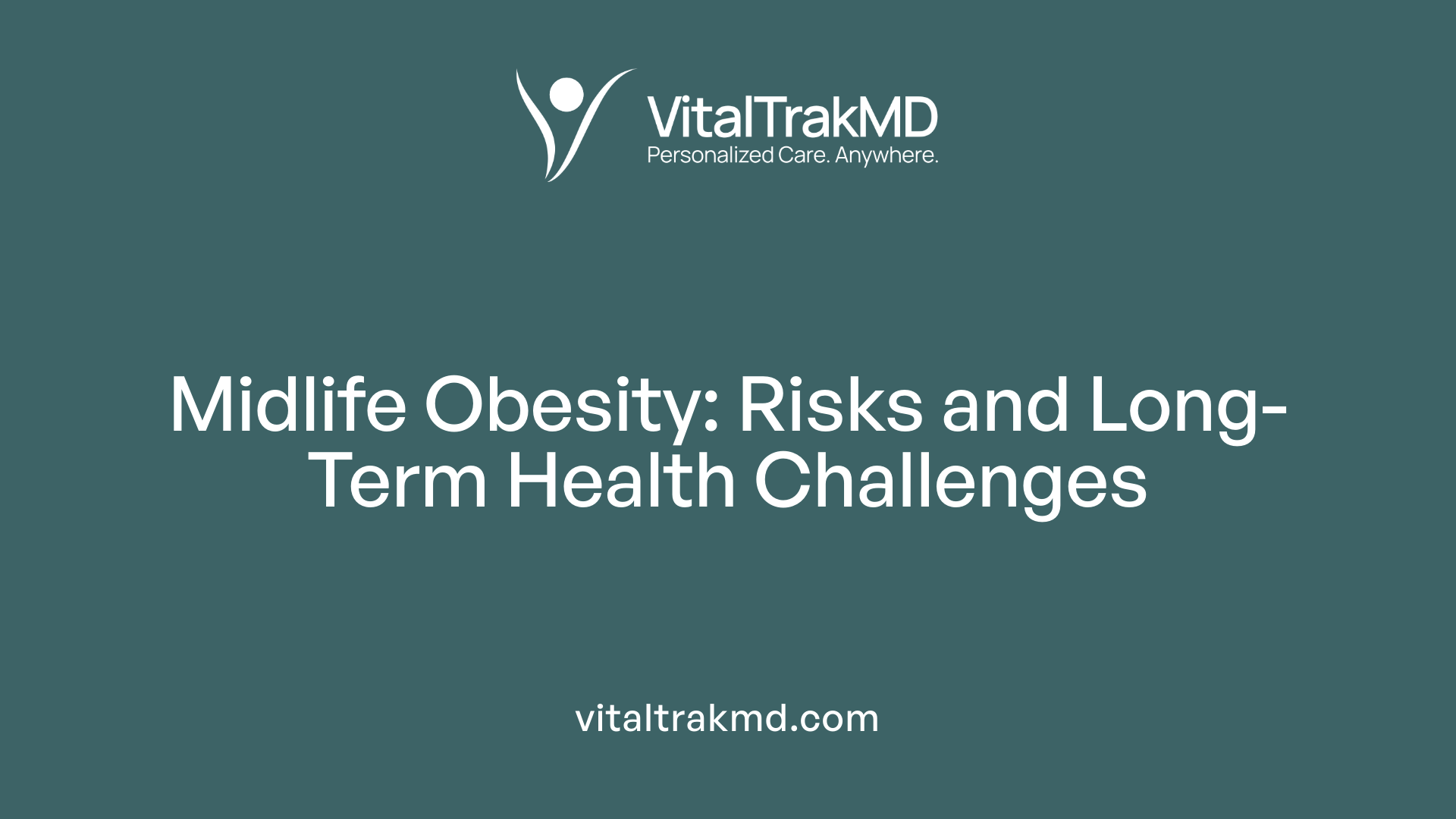
What are the health risks associated with obesity in midlife?
Obesity during midlife poses significant health risks, especially for the development of chronic conditions such as cardiovascular disease, hypertension, and type 2 diabetes. Individuals with excess body fat, particularly around the abdomen, have a higher likelihood of experiencing adverse metabolic effects, which can lead to an increased risk of heart attacks, strokes, and other cardiovascular events.
Research indicates that obese adults in their middle years are at a markedly increased risk of hospitalization and death from these illnesses. In some cases, the risk of death can be up to 11 times higher compared to individuals with normal weight. This heightened vulnerability is compounded when pre-existing conditions like diabetes are present.
The cumulative health burden associated with persistent obesity is substantial. Obese middle-aged adults often face more frequent healthcare needs, longer hospital stays, and higher medical expenses over time. Moreover, excess visceral fat contributes to inflammatory processes, which elevate the risk for certain cancers, especially in postmenopausal women.
However, achieving weight loss in midlife can have profound benefits. Sustained weight reduction has been shown to decrease the risks associated with these chronic illnesses, ultimately improving long-term health outcomes and quality of life.
Obesity and Its Connection to Heart Disease and Mortality
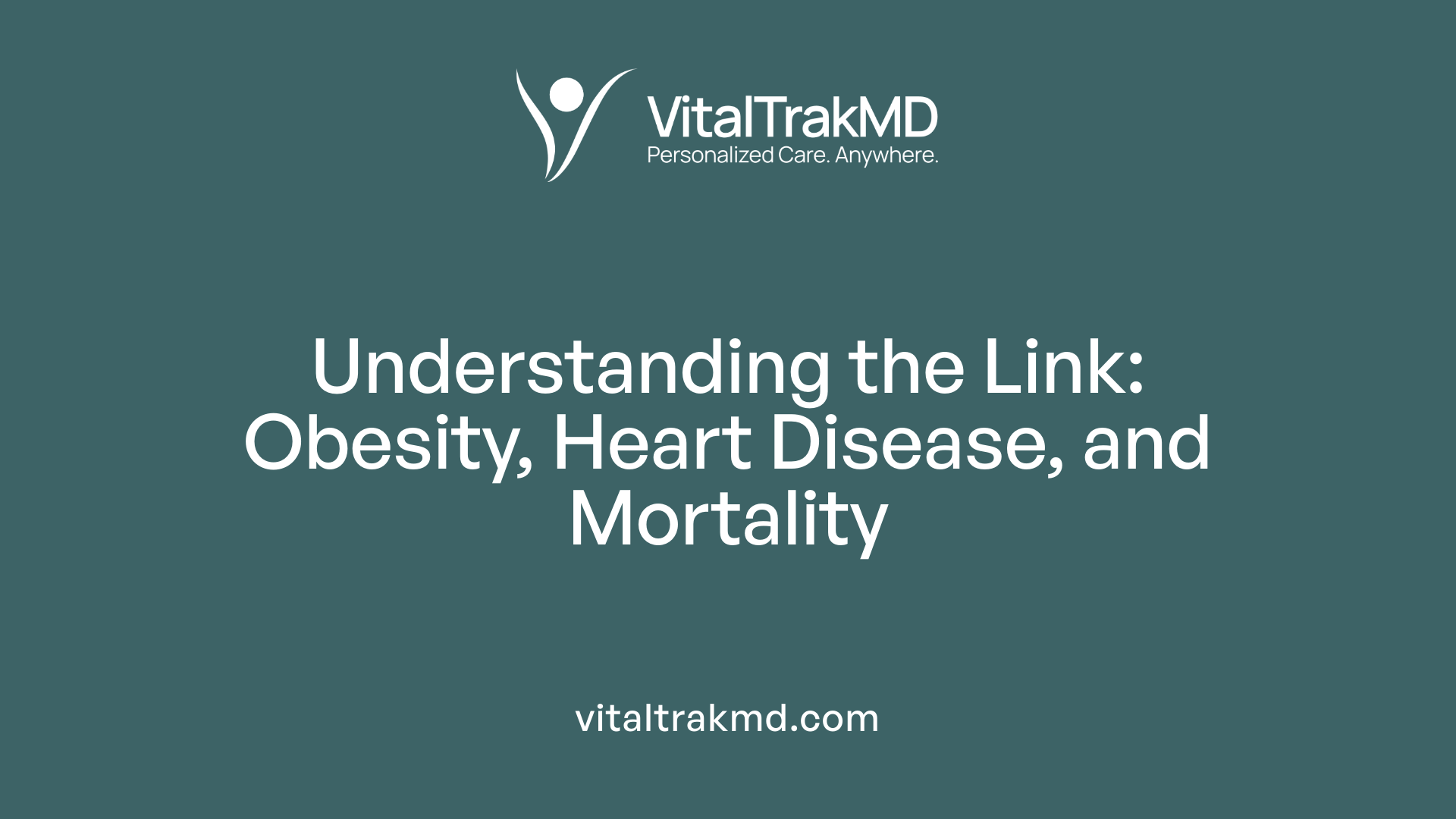
How is obesity related to other health issues such as cardiovascular disease and mortality?
Obesity is closely associated with serious health conditions, notably increasing the risk for cardiovascular disease (CVD) and early death. Excess body weight, especially around the abdomen, contributes to metabolic syndrome—a cluster of risk factors including high blood pressure, elevated blood sugar, abnormal cholesterol levels, and high triglycerides. These factors significantly heighten the likelihood of developing heart disease, stroke, and type 2 diabetes.
Visceral fat, the fat stored around internal organs, plays a vital role in this connection. It releases inflammatory substances and hormones that impair blood vessels and increase blood clotting, thereby elevating cardiovascular risk. Studies show that individuals with higher amounts of visceral fat face a greater chance of experiencing heart attacks and other cardiovascular events.
Long-term health impacts of obesity extend beyond the heart. Obesity can reduce lung capacity, increase the risk of sleep apnea, and contribute to joint problems such as osteoarthritis. It also has implications for mental health, often leading to lower quality of life, depression, and social stigma.
In summary, obesity acts as a significant catalyst for a range of life-threatening conditions. Managing body weight through lifestyle changes and medical interventions remains crucial for reducing the burden of cardiovascular disease and improving lifespan.
Lifestyle Strategies for Weight Management in Midlife
What lifestyle interventions are effective for managing weight in midlife?
Managing weight during midlife can be challenging due to physiological changes like hormone shifts, muscle loss, and fat migration to the abdomen. However, adopting a comprehensive approach involving diet, exercise, and behavioral adjustments can make a significant difference.
A balanced diet is essential. This includes consuming plenty of fruits, vegetables, lean proteins, and whole grains. Such diets not only help control caloric intake but also improve heart health and reduce inflammation.
Physical activity is equally important. Engaging in at least 150 minutes of moderate aerobic exercise weekly, combined with strength training twice a week, supports weight loss, muscle retention, and cardiovascular health. Resistance exercises are particularly effective in counteracting muscle loss and balancing body composition.
Behavioral modifications play a vital role. Setting realistic goals, monitoring food intake, and maintaining consistency help in long-term weight management. Professional support from healthcare providers or behavioral health specialists can enhance adherence to lifestyle changes.
Sleep quality and stress levels also impact weight. Poor sleep and high stress can lead to overeating and fat accumulation. Strategies like mindfulness, stress management techniques, and proper sleep hygiene are recommended.
Hormone therapy might also be considered for women during menopause to alleviate sleep disturbances and hot flashes, indirectly supporting lifestyle adherence by improving overall well-being.
Lifelong commitment to these healthy habits not only aids in weight control but also reduces risks for chronic diseases such as diabetes, hypertension, and heart disease. Early and sustained lifestyle changes are therefore crucial for long-term health during midlife.
Medical Options for Weight Loss: Medications and Surgery
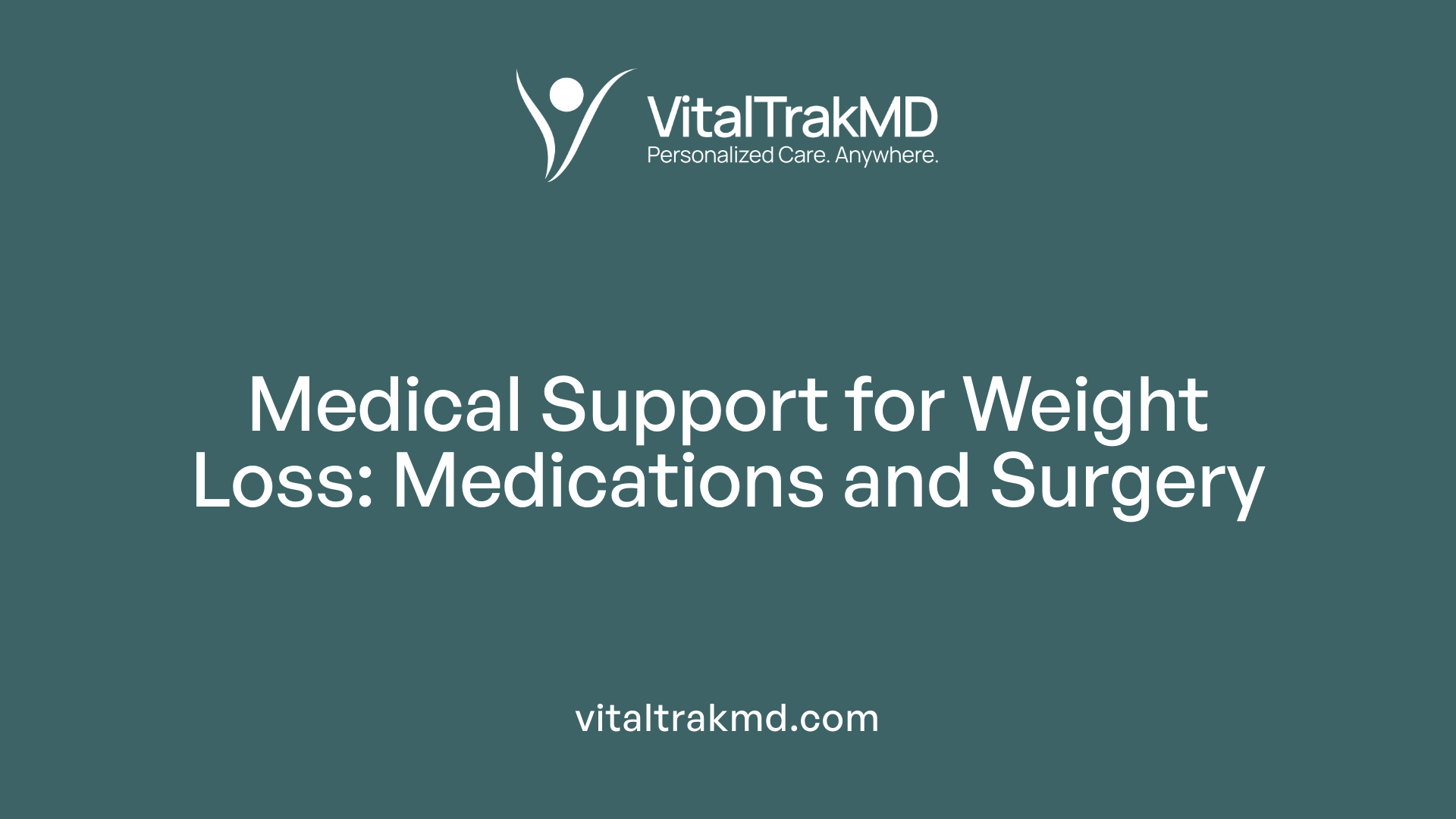
What medical options are available for weight loss, including medications and surgical procedures?
For individuals struggling with obesity, several medical options can support weight loss. Prescription medications approved by the FDA include drugs like Bupropion-naltrexone (Contrave), Liraglutide (Saxenda), Orlistat (Xenical, Alli), Phentermine-topiramate (Qsymia), Semaglutide (Wegovy), and Setmelanotide (Imcivree).
These medications often work by reducing appetite, increasing the feeling of fullness, or blocking fat absorption in the digestive system. They are generally used in combination with lifestyle changes such as diet and exercise to enhance weight loss efforts.
In addition to medications, surgical interventions are a highly effective option for severe obesity. Common procedures include gastric sleeve and Roux-en-Y gastric bypass. These surgeries are typically recommended for those with a BMI above 35, or above 30 with obesity-related health issues like diabetes or hypertension. Such surgeries can lead to substantial and sustained weight reduction, improving or even resolving associated health problems.
Non-surgical approaches like intragastric balloons (for example, Orbera®) provide temporary space-occupying effects to promote satiety. Medically supervised programs, which often incorporate meal replacements and behavioral therapy, also play an integral role in comprehensive weight management.
Overall, these medical options are tailored to individual health needs and must be overseen by healthcare professionals to maximize safety and effectiveness. Combining medication or surgery with ongoing lifestyle modifications offers the best chance for meaningful, long-term weight loss and health improvement.
Comparing Long-term Strategies: Surgery versus Medication
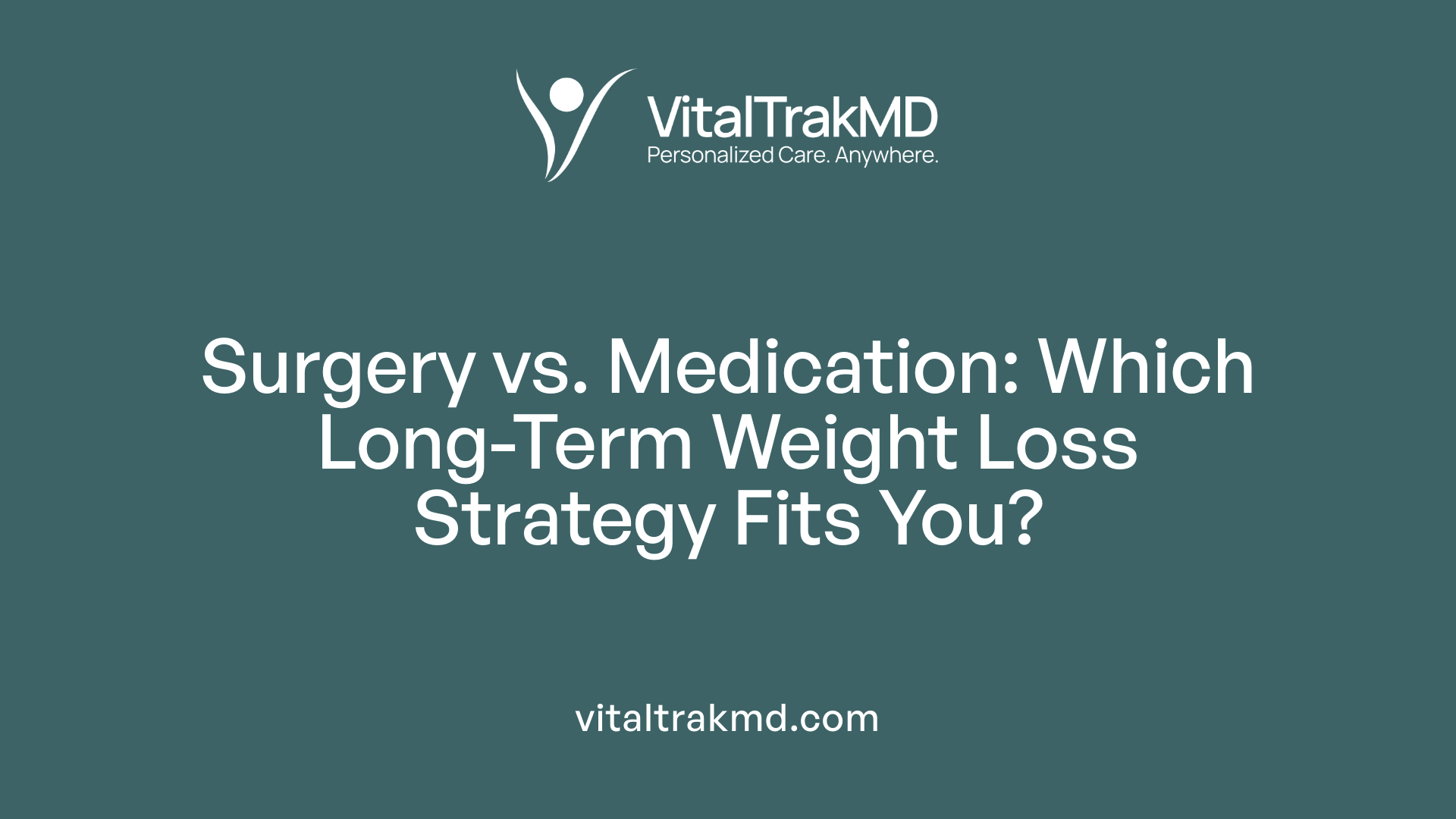 When evaluating long-term weight loss options, it’s important to consider effectiveness, sustainability, and individual circumstances.
When evaluating long-term weight loss options, it’s important to consider effectiveness, sustainability, and individual circumstances.
Surgical procedures like gastric bypass and sleeve gastrectomy usually produce significant and lasting weight loss, averaging about 55-57% of excess weight lost over five years. These surgeries are particularly beneficial for individuals with severe obesity (BMI above 40 or over 35 with health issues). However, they do not guarantee permanent results; some weight regain can occur without lifestyle changes.
On the other hand, medications such as liraglutide, semaglutide, and naltrexone/bupropion support weight reduction—typically around 5-10%. Often used alongside diet and behavioral therapy, these drugs are effective in helping individuals maintain modest weight loss and manage related health conditions like diabetes and hypertension.
Dietary approaches including calorie restriction, meal replacements, intermittent fasting, and behavioral modifications are widely used. While they can result in meaningful weight loss, sustaining these results over the long term can be challenging. Many individuals experience weight regain after initial loss, highlighting the importance of combining diet with regular physical activity and behavioral support.
Overall, research and clinical practice indicate that the best long-term outcomes often come from a multidisciplinary approach. This includes selecting surgical options when suitable, complemented by tailored diet plans, exercise routines, behavioral therapy, and pharmacological support. Personal health status, weight loss goals, and risk factors should guide decision-making for each individual.
Total Person Health Approach to Obesity
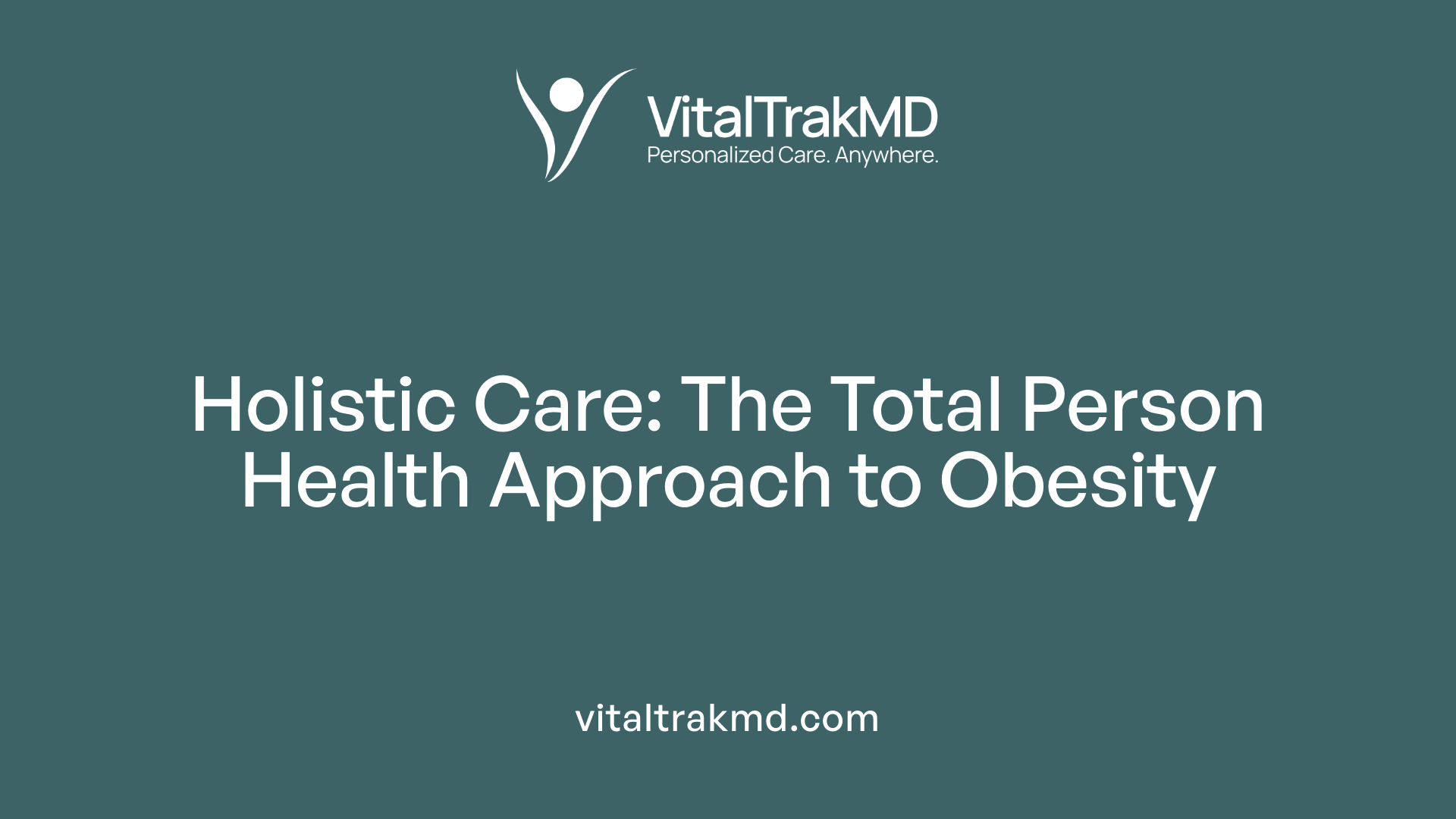
What is the role of Total Person Health in addressing obesity?
Total Person Health is essential in tackling obesity because it promotes a comprehensive view of health that goes beyond just weight management. This approach considers physical, emotional, behavioral, and social factors that influence overall well-being.
A holistic strategy involves not only medical treatments like diet changes, exercise, and medications but also addressing mental health, stress, sleep quality, and behavioral habits such as emotional eating and mindfulness. Recognizing that obesity is a complex, chronic disease, this approach encourages collaboration across healthcare providers, community resources, and policymakers.
By focusing on individualized care, tailored to each person’s cultural background, life circumstances, and health needs, the Total Person Health model aims to empower individuals with the knowledge and tools they need for sustainable health improvements. It also emphasizes addressing social determinants—like access to healthy foods, safe places for physical activity, and socioeconomic factors—that impact obesity.
This multi-dimensional approach helps reduce health disparities and improves outcomes for vulnerable groups disproportionately affected by obesity. Ultimately, by fostering supportive environments and personalized strategies, Total Person Health supports long-term weight control, reduces associated health risks such as diabetes and heart disease, and promotes overall well-being.
Empowering Middle-Aged Adults to Overcome Obesity
Addressing obesity in midlife requires a comprehensive, multidisciplinary effort that combines evidence-based lifestyle changes, medical interventions, and behavioral health support. As research underscores, effective weight management not only reduces the risk of cardiovascular disease, diabetes, and cancers but also improves overall quality of life. Programs like VitalTrak’s personalized approaches leverage scientific insights and holistic care to guide individuals on sustainable health journeys. By proactively embracing these strategies, middle-aged adults can take control of their health, minimize long-term risks, and enjoy the benefits of a healthier, more vibrant life.
References
- Strategies to Manage Obesity: Lifestyle - PMC - PubMed Central
- Weight Management for a Healthy Heart - UCSF Health
- Mayo Clinic Minute: Obesity and heart disease
- Increases in BMI and chronic pain for US adults in midlife, 1992 to ...
- The male diet boom: why men are tackling their midlife obesity crisis
- What Losing Weight Means for Your Health in Your 50s - AARP
- A 10-Week Physical Activity Program for a Hypertensive Obese Adult
- Breaking the Vicious Cycle of Obesity - TrestleTree
- Challenges in Cardiovascular Evaluation and Management ... - JACC
Recent articles
Want to Feel Better and Live Healthier?
Join hundreds of patients taking control of their health with personalized care that fits their life – not the other way around.
Rated 4.8/5 by 32+ customers







